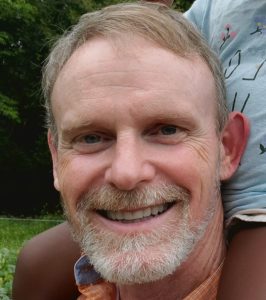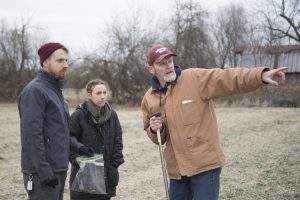Michael Burton spends the academic year teaching and conducting research in agronomy at Missouri State University. In the summer, he runs the family farm just outside Springfield, Missouri. You could say he practices what he preaches.

“On the farm, we grow sweet corn, strawberries and pumpkins among other crops — and it keeps me grounded,” Burton.
Farming also gives Burton a first-person view of what farmers want and the challenges they face.
J. Scott Angle, UF senior vice president for agriculture and natural resources and administrative leader of UF/IFAS, brought up Burton’s farming experience as one of many reasons he appointed Burton the next director of the UF/IFAS Southwest Florida Research and Education Center (SWFREC), effective July 1.
“Dr. Burton cares about producers because he is one, the leading local producer of sweet corn, strawberries, pumpkins and watermelons to a grocery store in Springfield,” Angle said. “And he espouses a leadership philosophy of encouraging and rewarding faculty for the work that needs to be done to serve stakeholders.”
Burton said he and his family were excited from the start about the possibility of moving to Southwest Florida.
“The passion and commitment of the SWFREC stakeholders, faculty, staff and students was so evident during the time I was in Immokalee — it really galvanized my interest,” he said. “I’m honored to lead this team.”
In addition to his teaching and research programs, Burton also has acquired some administrative experience at MSU. He’s served as dean’s proxy, filling in for the dean of the College of Agriculture, and he has served as a provost fellow at MSU.
Agriculture runs in his blood. Burton grew up on the family’s secondary-enterprise farm near Anderson, Indiana and spent 10 years in 4-H during his childhood. He also served as a state officer with Indiana’s FFA.

SWFREC’s primary mission is to help ensure growers are profitable, but not at the expense of natural resources.
Burton’s insight with growers may give him an edge with Southwest Florida stakeholders. As he arrives at SWFREC, Burton knows many issues and opportunities await. Issues include climate change, pests, diseases and natural resource conservation.
Those variables make it tougher for the region’s farmers to compete in the global marketplace.
“We’re at a key point for international competition,” Burton said. On the plus side, “Florida’s got some terrific options. There are excellent growers.”
That’s a major reason he’ll look significantly to the center’s advisory committee for input on how SWFREC can help them.
“We’ve got a pool of wonderful scientists and students at the center, and I look forward to working with them all.” Burton said.
He began his academic career as an assistant professor of weed ecology at North Carolina State before being promoted to associate professor and moving on to Missouri State.
Before his land-grant experience, Burton received a bachelor’s degree in political science from DePauw University in Indiana, then went to The Ohio State University, where he received two master’s degrees: one in public policy and the other in crop nutrition and seed physiology. Burton then received his doctorate in agronomy studying weed ecology from the University of Nebraska.
“Problem-solving is the key,” Burton said. “Florida benefits when we identify and extend solutions to problems our growers face. Removing or minimizing barriers to quality and productivity can reduce costs, keeping our products competitive and affordable.”
###
ABOUT UF/IFAS
The mission of the University of Florida Institute of Food and Agricultural Sciences (UF/IFAS) is to develop knowledge relevant to agricultural, human and natural resources and to make that knowledge available to sustain and enhance the quality of human life. With more than a dozen research facilities, 67 county Extension offices, and award-winning students and faculty in the UF College of Agricultural and Life Sciences, UF/IFAS brings science-based solutions to the state’s agricultural and natural resources industries, and all Florida residents.
 0
0
